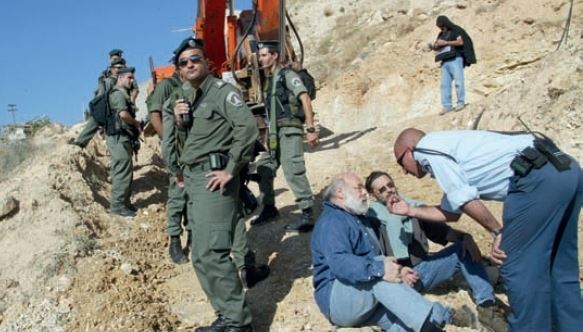
Tanja Kleibl of Trocaire describes the roles and responsibilities of international NGOs in enabling civil society space.
Earlier this year I met a Palestinian woman living in the Gaza strip. She explained that she can no longer sleep after four of her children and her husband were killed in an Israeli military attack during the 2009 Gaza War; an attack that also left her and two of her daughters severely burnt as a result of the use of white phosphorus by the Israeli Army.
The Gaza War and the subsequent Israeli policies of ‘closure’, which denies Palestinians the most basic rights and promotes a culture of impunity, have divided Palestinian civil society. These divisions have not been helped by internal divisions within Palestinian political factions. They have exacerbated existing problems and have limited the effects of initiatives calling for unity and solidarity. Sadly, Israel and the Occupied Palestinian Territory (OPT) is just one of many countries where civil society organisations (CSOs) that work on governance and human rights issues face increasingly challenging working conditions. Experiences from Israel and the OPT also highlight the importance of addressing questions of civil society solidarity and protection when discussing how national and international CSOs should respond to shrinking space for civil society action.
A global crackdown on CSOs
In a recent post on his ‘From poverty to power’ blog, Duncan Green asked: is there a global crackdown on CSOs and if so how should we respond? The answer to the first part is easy. Trócaire’s recent policy report ‘Democracy in Action: Protecting Civil Society Space’ found evidence of a clear trend towards shrinking political and operational space for civil society. The second part is where it gets tricky. Governments are ultimately responsible for the protection of human rights, yet there are obvious double standards being applied by many governments in their response to human rights abuses at home and overseas. Much more could be said here, and more demands made of donors, recipient countries and the international community as a whole. But what about civil society; how should we respond? What are the roles and responsibilities of international non-governmental organisations (INGOs) like Trócaire? As violent crackdowns on civil society become more widespread, the protection of civil society actors and organizations becomes increasingly important and is one area where INGOs can help. Experiencing increased threats against operational and political space (from criminalisation of project activities to threats to personal security), Trócaire and its partners decided to investigate ways to protect staff and partners working in countries with increased tension and oppression against governance and human rights work.
Following this, Trócaire developed and piloted a set of guidelines on working with and protecting partners at risk. While the guidelines emphasise that primary responsibility for partner security lies with partners themselves, they also outline Trócaire’s role in assisting partners to prevent and respond to security-related risk. This assistance can take various forms from risk management, security planning and also utilising advocacy mechanisms for staff and volunteers of partners in imminent danger.
Forms of INGO assistance
For example, during the regime of Bingu wa Mutharika, Malawi witnessed a crackdown on civil society which led to 20 people being killed during protests in 2011. Despite threats to personal security, Malawian CSOs came together, through a platform created to promote civil and political rights. Trócaire supported its partners and other key CSOs in Malawi to put in place plans to ensure better security for their offices, staff, and data. This included supporting training, providing funds to improve physical security of offices and homes, as well as digital security training and technical support. Following the death of Mutharika, and the announcement of Joyce Banda as President earlier this year, there is cautious optimism that the crackdown on civil society will cease and that space will open up. Trócaire experience also demonstrates that in order to enable space for civil society, underlying political and social drivers of poverty, vulnerability and inequality have to be addressed and the best way to do this is through applying a rights-based approach to development. This should be imbedded into a broad development strategy that integrates practical approaches to local peoples’ and partners’ protection, as well as work on increasing political participation, and the protection and promotion of civil and political as well as economic, social and cultural rights. Demonstrating solidarity is also important. INGOs can support their partners by undertaking policy and advocacy work which aims to challenge the current imbalances of power leading to oppression. Following our research on civil society space, Trócaire has been working to promote an enabling environment through lobbying the UN and EU and influencing the international debate about aid effectiveness, both alone and through Trocaire’s national and international networks. One of Trocaire’s networks, CIDSE, an international alliance of 16 Catholic development agencies from Europe and North America, has recently established a working group with the objective of learning from global experiences, to inform programming and advocacy responses to the increasing threats presented by the shrinking space for CSOs, and determine what role INGOs should play in mitigating those threats. While the obligation to promote and protect human rights rests solely on governments, other stakeholders, be they donors or INGOs, also have an important role to play. Faced with an increasingly hostile environment, civil society solidarity and protection is more important than ever. As INGOs we have to ensure we play our part, by supporting partners on the ground, influencing donors, and speaking out against violations. There is no one way to approach this role but whatever form our support takes it has to be guided by the concept of solidarity.
Tanja Kleibl
Team Leader, Governance and Human Rights Trócaire
tkleibl(at)trocaire.ie
